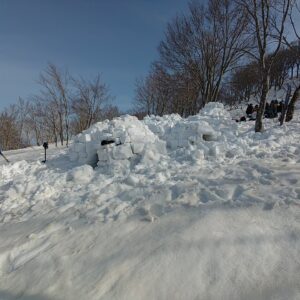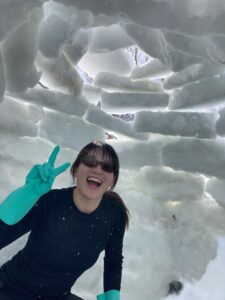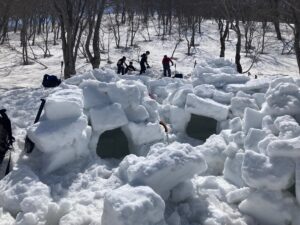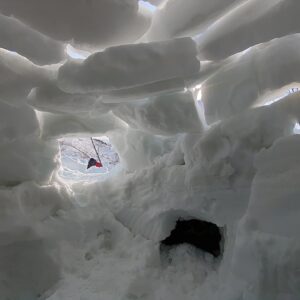Tohmi Ridge, Jizo no Kashira, a Popular Spot for Snow Mountain Training
The last igloo building training session of the season took place at Jizo no Kashira col on the Tohmi Ridge in Hakuba. This is a training site accessible with a 5-minute horizontal walk from the lift.Last month, another team was conducting avalanche search training and winter mountain camping practice here. The site of the 1989 avalanche incident was on the steep slope just across a small stream from here. It’s a place frequently used by the Nagano Mountain Federation and mountain clubs, and it’s also common for tent camping.
For igloo building training, it’s best to have untouched snow, so we conducted the training on a steep slope slightly away from the flat col. This is because if the snow has been previously disturbed by someone else digging, the blocks won’t cut cleanly. Whether on a slope or a snow ridge, you can still build an igloo.
Igloo Building with Gakujin-kai after 8 Years
The leader from the previous training session, Mr. Imamura, was joined by energetic young participants plus five others. One of them is Genya Takenaka, an 8th-year alumnus of the Hokkaido University Mountaineering Club, currently immersed in alpine climbing and striving to conquer challenging walls.He mentioned feeling nervous even in civilization because he’s heading to Denali’s Cassin Ridge next week. He just arrived in Kofu this spring. Two years ago, he camped in an igloo on the narrow snow ridge of the challenging peak Taulliraju in the Peruvian Andes.
Mr. Yagi, a third-year member of the Yamanashi University Mountain Club, also participated. Ten years ago, during my time in Kofu, I frequently went on igloo camping trips with members of the Yamanashi University Mountain Club. That’s when I realized how tough it is to build an igloo on Mt. Fuji! There’s either too little snow or too much wind, so even though you can build it, you end up with powder snow blowing in through the gaps.
Over the past three years of the pandemic, club activities have been restricted, and there has been a loss of connection with the seniors at Yamanashi University.? He mentioned that he’s currently working alone to rebuild the club from scratch. I also want to organize igloo camping trips for Yamanashi University again. In contrast, it seems that the Hokkaido University Mountain Club has managed to continue going to the mountains despite the university’s restrictions and the societal mood for self-restraint. They have found ways to overcome the challenges posed by the pandemic. This overcoming of the pandemic challenges could be an interesting theme to reflect on in the upcoming 100th anniversary publication.
Yukako’s Big Igloo Comeback Victory
Yukako initially made her igloo a bit too big, and she had trouble removing large blocks from the second tier, resulting in small, misshapen blocks. She was about to give up.
However, after demonstrating the proper technique for digging a 30cm deep trench, she grasped the method and was able to remove extra-large blocks easily in the latter half. It took some time, but she had a breakthrough.
Designing a radial igloo colony
I proceeded with a plan to individually construct igloos, each connected to a central large assembly igloo via tunnels. First, I demonstrated building a single-person igloo in 40 minutes. Then everyone made their own individual igloos radiating from the center, and? I built the large center igloo again. Since the snow was about 1.5m deep, we estimated that we could dig about 1m down. Because of the slope, the upper igloos ended up being a bit higher.
In reality, it was warm at night, and we had lively conversations at the outdoor table seats until late, so we ended up not using the large igloo. During the cold season, we could all huddle in there and chat while sitting on the ground.
The next day, everyone made one igloo each to confirm their skills, and we had lively conversations about mountains and worldly matters before descending. The snow on the ski slope barely reached the bottom.
Next time, I’ll summarize the points of igloo building specific to warm weather.




 HOME
HOME
 メニュー
メニュー
